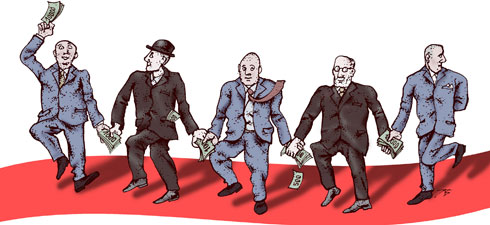"Got an old party grandee, send him to Europe!" This is a popular squib about over-the-hill politicians who are dispatched to Brussels for permanent disposal, where they eke out the rest of their insignificant existence. No-one pays them any mind anymore. Cameras and microphones get switched off as they hobble up to the lectern. Anonymous mice in grey rainy day Brussels.
Not by a long shot, however! Only princes presumably still live better than Brussels commissioners. And the latter have more political clout, if they want it, than your garden-variety government minister in Berlin. Financially, they’re a whole lot better off than most of their fellow party members – the guys who snatched them from their cushy numbers at home and kicked them upstairs “to Europe”, the guys whose meagre paychecks can only be laughed at in Brussels.
The fact is thatEU commissioner is a dream job: a life of luxury replete with chauffeur, personal assistants, spokespersons, a whole slew of helpers – and lavishly remunerated to boot. And when their stint in Brussels expires, then things really take off: with a fat “resettlement allowance”, then a “transitional allowance”, followed by heavenly old-age pensions. The austerity appeals that regularly make the continental rounds, the calls to raise the retirement age to 70 – none of that applies to Brussels. There is money aplenty here. The subsidy coffers are overflowing. So why not dig in?
Pensions that ease "transition to the job market"
In the offices of the concrete block dubbed "Berlaymont", at the hub of the Brussels Eurocracy, everyone earns good money. Even a fledgling interpreter starts out with a basic salary of €4,190. A top official makes a good €16,000 a month. Plus allowances to cover expatriation and housekeeping expenses, as well as child benefits, child-raising and pre-school allowances. The kids go to EU prep schools, for which Europe’s taxpayers foot the bill to the tune of €100 million per year.
For the political top brass, needless to say, the emoluments have to be topped up a notch: a commissioner’s base salary weighs in at €19,910.Commission president José Manuel Barroso grosses €304,000 per annum. And most of the leading Europeans also get a “local bonus”. So the new EU foreign affairs chief,Baroness Catherine Ashton, makes roughly €323,000 a year. Not to mention additional allowances to cover her private household and representation costs: all in all, the Labour Lady ennobled by party chief Tony Blair leaves her peers, including the likes of Angela Merkel and Hillary Clinton, in the dust. Not only that: she gets to rush off early to London on Thursdays to see her kids.
But commissioners are not appointed for life. They are, as a rule, replaced after one or two five-year terms of office. Lest that leave them high and dry, they are subsequently entitled to 40 to 65% of their basic salary – that comes to roughly €10,000 a month – for three years. That’s to “help the transition to the job market”. Only the transition doesn’t seem to be all that tough. For example:
Ex-industry commissioner Günter Verheugen got jobs at British and German banks, at a Turkish trade association and an American PR agency in Brussels; with his ex-cabinet chief,Verheugen also started up a consulting firm.
Ex-external affairs commissioner Benita Ferrero-Waldner holds high-paid posts at a German insurance group and a Spanish electric company.
Ex-single market commissioner Charlie McCreevy landed a job at budget airline Ryanair.
Ex-consumer protection commissioner Meglena Kunewa was taken aboard by a French bank.
Some get to make the rules...
It appears that at least 15 former commissioners are receiving a transitional allowance although they have long since found new employers. They’re making a killing. And they’re entitled to it under the regulations.
Plentiful old-age provisions are likewise in place for commissioners and other top-flight execs at the European institutions. After working for Europe for 16 years, they qualify for the maximum EU pension rate: 70% of their last salary. For most high-ranking lifelong officials, that means an old-age pension of well over €10,000 monthly, for which they will never have to pay any social security contributions.
A German top-salaried employee could pay maximum contributions into the pension scheme his whole life long: he’d still never make that much in retirement. But that’s just the way it is: some get to make the rules, the others get to foot the bill.
Translated by Eric Rosencrantz
Was this article useful? If so we are delighted!
It is freely available because we believe that the right to free and independent information is essential for democracy. But this right is not guaranteed forever, and independence comes at a cost. We need your support in order to continue publishing independent, multilingual news for all Europeans.
Discover our subscription offers and their exclusive benefits and become a member of our community now!












